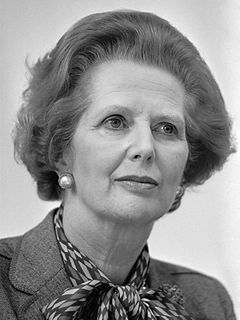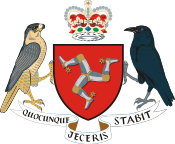
The government of the Isle of Man is a parliamentary representative democracy. As a Crown Dependency, it is not subordinate to the government of the United Kingdom. That government, however, is responsible for defence and external affairs and could intervene in the domestic affairs of the island under its residual responsibilities to guarantee "good government" in all Crown dependencies. The Monarch of the United Kingdom is also the head of state of the Isle of Man, and generally referred to as "The Queen, Lord of Mann". Legislation of the Isle of Man defines "the Crown in right of the Isle of Man" as separate from the "Crown in right of the United Kingdom". Her representative on the island is the Lieutenant Governor of the Isle of Man, but his role is mostly ceremonial, though he does have the power to grant Royal Assent.

The 1983 United Kingdom general election was held on Thursday 9 June 1983. It gave the Conservative Party under the leadership of Margaret Thatcher the most decisive election victory since that of the Labour Party in 1945.

The 1945 United Kingdom general election was held on 5 July 1945, with polls in some constituencies delayed until 12 July and in Nelson and Colne until 19 July, because of local wakes weeks. The results were counted and declared on 26 July, to allow time to transport the votes of those serving overseas.

The Legislative Council is the upper chamber of Tynwald, the legislature of the Isle of Man. The abbreviation "LegCo" is often used.

The 1918 United Kingdom general election was called immediately after the Armistice with Germany which ended the First World War, and was held on Saturday, 14 December 1918. The governing coalition, under Prime Minister David Lloyd George, sent letters of endorsement to candidates who supported the coalition government. These were nicknamed "Coalition Coupons", and led to the election being known as the "coupon election". The result was a massive landslide in favour of the coalition, comprising primarily the Conservatives and Coalition Liberals, with massive losses for Liberals who were not endorsed. Nearly all the Liberal MPs without coupons were defeated, although party leader H. H. Asquith managed to return to Parliament in a by-election.
The Isle of Man partially elects its legislature at the national level. The High Court of Tynwald consists of two chambers. The House of Keys has 24 members, elected in a general election for a five-year term in 12 two-seat constituencies. Each voter has two votes and in each constituency the two candidates with the most votes are elected. The Legislative Council has 11 members: three ex-officio members and eight other members who are elected by the House of Keys for a five-year term. Political parties do not play an important role on the Island. The Isle of Man lowered its voting age from 18 to 16 in 2006.

The Liberal Vannin Party (LVP) is a political party on the Isle of Man. It was founded in 2006 by Peter Karran, then an Independent MHK for Onchan. Karran had been, until 2004, a member of the Manx Labour Party.

The Westminster Abbey by-election, 1924 was a parliamentary by-election held on 19 March 1924 for the British House of Commons constituency of Westminster Abbey in London. It was notable for the challenge of Winston Churchill to the party system.
The Acton by-election, 1943 was a by-election held on 12 December 1943 for the British House of Commons constituency of Acton in London.
The University of Wales by-election, 1943 was a parliamentary by-election held in the United Kingdom between 25 and 29 January 1943 for the House of Commons constituency of University of Wales.
Timaru was a New Zealand Parliamentary electorate, in the South Island. It existed continuously from 1861 to 1996 and was represented by eleven Members of Parliament.
Walter Clucas Craine was a politician and trade unionist from the Isle of Man. He was a long-time Member of the House of Keys and the first Labour mayor of Douglas. Outside politics he worked as a baker, commercial traveller and insurance agent.
The Bury St Edmunds by-election, 1944 was a parliamentary by-election for the British House of Commons constituency of Bury St Edmunds, Suffolk on 29 February 1944.
The second elections to the Carmarthenshire County Council were held in May 1999. It was preceded by the 1995 election and followed by the 2004 election. They resulted in a coalition between Independent councillors and Plaid Cymru for the next five years.

General elections were held in the Isle of Man on 22 September 2016. Independents won 21 of the 24 seats in the House of Keys. A record number of women were elected.

General elections were held in the Isle of Man between 27 October and 6 November 1919. Independent candidates won a majority of seats in the House of Keys.

General elections were held in the Isle of Man between 28 October and 6 November 1924. Independent candidates won a majority of seats in the House of Keys.

General elections were held in the Isle of Man between 23 and 29 November 1934. Independent candidates won a majority of seats in the House of Keys.










